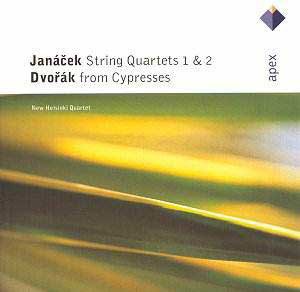It is good to see the
two marvellous Janáček quartets taking such a firm place in the
record catalogue. They have steadily increased in popularity to the
point where they virtually rival the Bartók quartets, and there is the
same obvious appeal for chamber enthusiasts who want to sample
a very different sound from a conventional string quartet.
Having greatly enjoyed the New Helsinki’s recent Apex
disc of Grieg and Sibelius quartets, I looked forward to this new re-issue
with keen anticipation. I was not disappointed. The group play with
a real feeling for the unusual textures that the composer creates, and
both works benefit from a mixture of vital rhythmic attack, warm tonal
blend and, not least, extremely realistic recording.
As is by now pretty well known, these works date from
the amazingly creative final decade of the composer’s life, when he
was infatuated with Kamilla Stosslová. Many of his pieces from
this period have programmatic or autobiographical associations, and
the two quartets illustrate more clearly than most the presence of Kamilla,
the first indirectly, the second more openly.
For his First Quartet, written in a week in 1923, and
taking Tolstoy’s novella of 1899 as his subtext, Janáček
uses the themes from the story (betrayal, a loveless marriage, inflamed
but unreciprocated passion) to illustrate in musical terms his own triangle-like
situation. Actually, one need know nothing of this to enjoy the music,
which abounds in originality and inventiveness. The opening chord
has an anguish that is immediately arresting, and this refrain keeps
re-appearing throughout the movement, being alternated with typical
fanfare-like flourishes. The piece is rife with markings like energico
ed appassionato, molto espressivo, come un lamento, and very tellingly
in the finale, jako v placi (‘like in tears’). This is very emotional
music, with violent outbursts (usually marked sul ponticello)
continually interrupting the lyricism. The New Helsinkis miss none of
this, and their precision of ensemble and clarity of attack is admirable.
The Second Quartet is even more intense and direct.
Written in about three weeks and given the unambiguous subtitle ‘Intimate
Letters’, it appears to contain direct depictions of specific characters
and events. Indeed, in his letters to Kamilla, Janáček
was clear who is at the centre of the work, “…you are
behind its every note, alive, passionate, loving". This is the
music of a mature master with the heart of a young man in love. On the
whole, the piece is less abrasive and more subdued in its outbursts
than the angry earlier quartet, and again the New Helsinki Quartet do
full justice to the passion and mood swings inherent in the work. The
opening motif, said to represent the first time the composer saw Kamilla,
acts as a kind of motto theme, returning in various guises, and the
New Helsinki seem to get to the heart of this structural device immediately,
giving it a due weight and importance. They also appear to have Janáček’s
own words in their minds throughout their performance; having heard
the work premiered, he declared “This piece was written in fire. I think
that I won’t write a more profound or truer one”. Little more than a
month later he was dead.
As a short, contrasting,
but entirely appropriate filler, the New Helsinki play a selection of
Dvořák’s string quartet arrangements of his youthful love songs
known as Cypresses. These are charming and intimate miniatures,
full of melodic invention, and here played with
all the style and delicacy one could hope for. Rival discs do offer
more substantial fillers (the Janáček quartets are quite short),
but in many ways this ceases to be an issue when the main works are
so well played, recorded, and so inexpensive. Even the liner
notes are more than adequate.
I have become a real fan of the enterprising and extremely
well presented Apex series, and certainly no-one investigating this
marvellous release will have any cause for complaint.
Tony Haywood


![]() See
what else is on offer
See
what else is on offer 